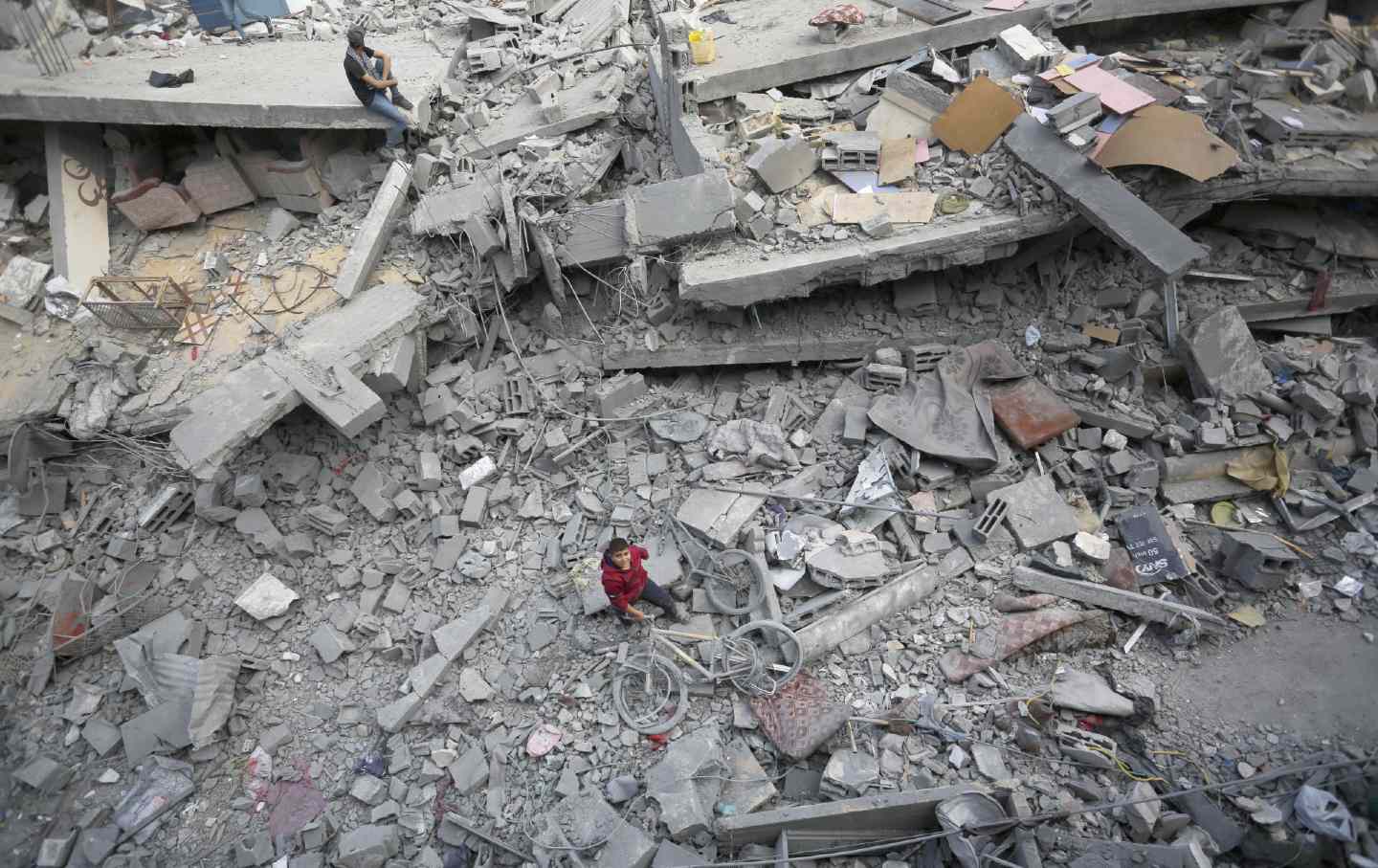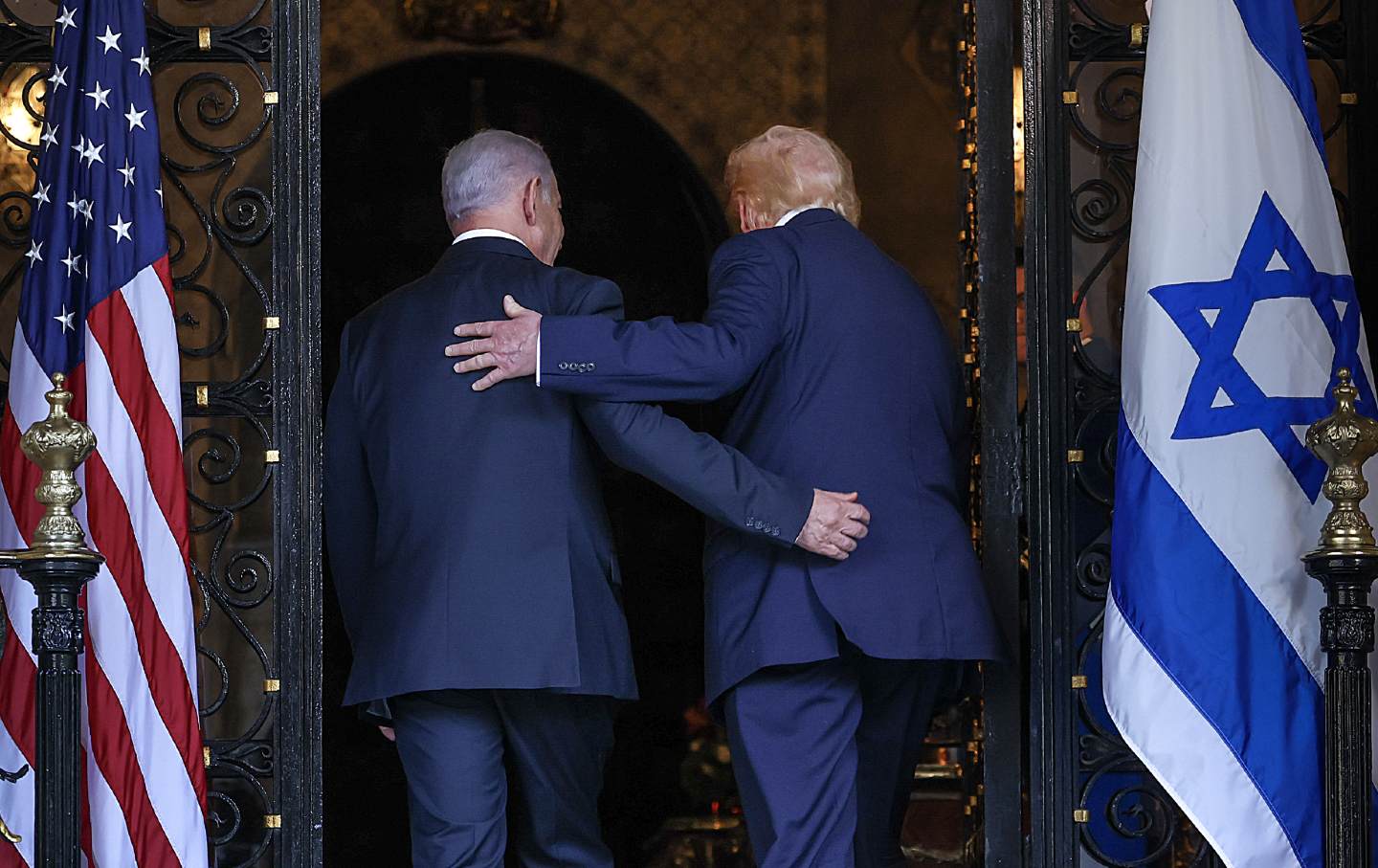Israel’s Vietnam—and Ours
Everything that Israel is doing to the people of Gaza—especially killing civilians through intensive aerial bombardment—was prefigured during the American “ground war” in Vietnam.

Comparisons between Israel’s destruction of Gaza and America’s war in Vietnam are becoming more and more overt (see “In Campus Protests Over Gaza, Echoes of Outcry Over Vietnam,” The New York Times, December 24, 2023). Then as now, we see an ever-widening divide between a part of the citizenry motivated by shame over the slaughter of innocents, versus a political establishment that maintains its killing regime regardless of growing horror among the world’s peoples.
Of course, there are differences. The unyielding government in this case is Israel and only secondarily its uneasy enabler, the Biden administration. The protest movement rises here in the United States, led in large part by Palestinian and Arab Americans, while anti-war forces in Israel itself are isolated and repressed. Most tellingly, by the late 1960s, the cutting edge of the movement against the Vietnam War was inside the US military, in mutinies and systematic attacks on officers. There are few such cracks in the IDF, and other than the remarkable solidarity with Palestinians shown by groups like Ta‘ayush and B’Tselem, most Jewish Israelis embrace their identity as a warrior society, as if there is no other way to survive than total domination. Finally, there is no comparison between the fragmented Palestinian national movement and Vietnam’s disciplined struggle for national liberation, which humbled first the French and then American militaries. The Vietnamese constantly reiterated that they were not fighting the American people, whom they counted as allies, only the US government that occupied their country. Hamas makes no such distinction, and on October 7 sought to slaughter as many Israelis as it could.
Regarding these two wars, there is a deeper parallel, however, which Americans need to remember. Everything that Israel is doing to the people of Gaza—especially the killing of tens of thousands of civilians through intensive aerial bombardment—was prefigured during the eight years of the American “ground war” in Vietnam, 1965–73. Then as now, this was a scorched-earth strategy, to eradicate invisible enemy fighters by destroying everything around them, like setting fire to a haystack to expose the needle. It was also a strategy focused on minimizing one’s own casualties, regardless of how many civilians died in the process. Like their Israeli counterparts today, US commanders in Vietnam were unwilling to order their men to engage the enemy face-to-face, as the cost would be much greater than their populations would accept. American troops went on “search and destroy” missions mainly as bait to attract fire, so that combined air and artillery attacks could then pulverize the landscape. It’s a coward’s way of war, and also essentially criminal—if the law of war as codified in the Geneva Convention means anything.
Nor was this in any way new, as Vietnam’s killing fields extended a military doctrine developed decades earlier. As Benjamin Netanyahu has pointed out with his characteristic schadenfreude, the indiscriminate murder of enemy noncombatants is exactly what the Americans and British practiced in World War II. Well before Hiroshima and Nagasaki, Gen. Curtis LeMay oversaw the firebombing of 63 Japanese cities, killing 100,000 civilians in Tokyo alone. From February 1942 on, the Royal Air Force made no pretense of hitting military targets and simply unloaded as many bombs as it could to destroy civilian morale by “dehousing” German cities. This was war as retribution; the tens of thousands of Dresdeners incinerated in February 1945 were the final victims of an RAF “area bombing” campaign that killed 600,000 civilians. (Although the Nazis were blamed for beginning this practice, notably the 1940–41 “Blitz” targeting British cities, which killed 40,000, it was actually Britain that first used airpower against civilians, to put down Iraqi rebels in the 1920s.)
This way of war carried over to Korea, where every city in the North was systematically firebombed, before reaching its apogee in Vietnam, where the United States dropped 4 million tons of bombs on rural South Vietnam. For good reason, the historian Nick Turse called his book documenting this carnage Kill Anything That Moves. An estimated 3 million Vietnamese died in that war, of which 1 million or so were combatants of the People’s Army of [North] Vietnam or the National Liberation Front of South Vietnam. The majority were civilians bombed, blown up, napalmed, shelled, or machine-gunned by US forces. And that is the real parallel to what is happening today. If the word “genocide” is invoked by respected historians to describe the destruction of Gaza , that word surely applies to the US war against the people of Vietnam.
No one should read this historical comparison as normalizing the atrocities ordered by Netanyahu and his generals. With methodical efficiency, they have compressed the worst lessons of war as practiced since 1939 into a killing zone of exemplary savagery. But this need not be a moral wasteland. The American war in Vietnam generated the largest mass movement in our country’s history, a tidal wave mobilizing millions of every age and description to say, “Not in my name!” The United States was forced to withdraw from Vietnam in large part because its citizens no longer supported the war—and its soldiers were no longer willing to fight it. Let us hope that an equivalent awakening comes to Israeli Jews, inspired by the powerful organizing of Jewish Voice for Peace, IfNotNow, and groups like them here in the United States. May they be a light unto the world.
Support independent journalism that does not fall in line
Even before February 28, the reasons for Donald Trump’s imploding approval rating were abundantly clear: untrammeled corruption and personal enrichment to the tune of billions of dollars during an affordability crisis, a foreign policy guided only by his own derelict sense of morality, and the deployment of a murderous campaign of occupation, detention, and deportation on American streets.
Now an undeclared, unauthorized, unpopular, and unconstitutional war of aggression against Iran has spread like wildfire through the region and into Europe. A new “forever war”—with an ever-increasing likelihood of American troops on the ground—may very well be upon us.
As we’ve seen over and over, this administration uses lies, misdirection, and attempts to flood the zone to justify its abuses of power at home and abroad. Just as Trump, Marco Rubio, and Pete Hegseth offer erratic and contradictory rationales for the attacks on Iran, the administration is also spreading the lie that the upcoming midterm elections are under threat from noncitizens on voter rolls. When these lies go unchecked, they become the basis for further authoritarian encroachment and war.
In these dark times, independent journalism is uniquely able to uncover the falsehoods that threaten our republic—and civilians around the world—and shine a bright light on the truth.
The Nation’s experienced team of writers, editors, and fact-checkers understands the scale of what we’re up against and the urgency with which we have to act. That’s why we’re publishing critical reporting and analysis of the war on Iran, ICE violence at home, new forms of voter suppression emerging in the courts, and much more.
But this journalism is possible only with your support.
This March, The Nation needs to raise $50,000 to ensure that we have the resources for reporting and analysis that sets the record straight and empowers people of conscience to organize. Will you donate today?








